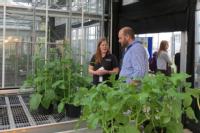Healthy Soils
The soil is the thin, fragile and living surface of the planet. It supports the majority of food production and humans have been degrading it from the day we first starting farming. Over time, much of the world’s soils have become eroded, exhausted and depleted of their health and fertility. As the pressure to produce more and more food increases so the pressure on soils becomes more extreme.
The UK is lucky to have mostly good soils and a benign climate but even here the pressure to produce food is resulting in our soils becoming poorer. We do not suffer the wind driven erosion of the American mid-west but soil losses through run-off after heavy rain is an issue but perhaps more importantly constant cropping is removing soil organic matter and soil carbon at a rate that is not sustainable.
Soil type and quality was demonstrated and explained by Rob Lillywhite, using a two crop (strawberry and peanut) unreplicated pot trial using amended and unamended soils. The trial included four different soils (sandy, sandy-loam, silt and organic) and three treatments (unamended, amended with compost, amended with copper). The purpose was to demonstrate crop growth on good, average and poor soils. There was a static display of different soil types and beneficial organic amendments.
LEAF (Linking Environment and Farming) are using their Simply Sustainable Soils programme to understand and promote sustainable soil practices. Alice Midmer, one of our MSc students who is undertaking a placement at LEAF was there to explain the programme.
Biofumigation is a process whereby a crop is grown and incorporated into the soil with the aim of reducing pests and diseases. In its strictest sense biofumigation refers to brassica crops which release specific compounds during this process which kill pests and pathogens. However green manures are also used in a similar way with the aim of stimulating beneficial microorganisms in the soil. The use of biofumigant and green manure crops are being investigated for the control of cavity spot of carrot (HDC Project FV405) and Sclerotinia disease (HDC PhD project CP80) with early promising results.




